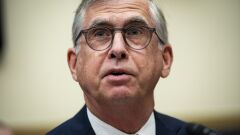2023 was a big year for banking — the spring banking crisis and its regulatory aftermath took up most bankers' energy all year — and 2024 looks to be just as consequential, if hopefully not as dramatic. A presidential election will determine who controls the White House and the regulatory agenda. The economy is struggling to lift off past inflation, and the Fed's rate moves will be closely watched. American Banker's reporters and editors looked at the industry to see which players are likely to have the most impact on banks this year. Check out our picks, listed in alphabetical order.
Sam Altman

Altman, who leads OpenAI as CEO, is a Silicon Valley veteran, having previously worked his way up to leadership at Y Combinator, a startup accelerator that launched fintechs like Stripe, Brex and Coinbase. In 2015, Altman co-founded OpenAI with a team of tech heavyweights, including Elon Musk (another one of American Banker's 24 people to watch in 2024), with the goal of advancing "digital intelligence in the way that is most likely to benefit humanity as a whole."
The 38-year-old Stanford dropout has since overseen the push of artificial intelligence past previously-established boundaries, while
Banks, notably risk-averse in nature, have toed the line of remaining relevant with technology and introducing danger to their ecosystems. While it's still early days for the
OpenAI is the large language model provider for a number of financial firms:
In November, amid generative AI being a hot topic of the year, Altman
Altman has championed AI this far and, in 2024, there are no signs that banks' excitement for the technology will temper. Artificial intelligence is one of the top technology priorities for banks next year,
Michael Barr

Heading into 2024, things don't seem to be slowing down for the Fed's chief regulator.
Alongside Federal Deposit Insurance Corp. Chair Martin Gruenberg and Acting Comptroller of the Currency Michael Hsu, Barr is championing a set of regulatory reforms that could have sweeping impacts on the banking system. This includes risk-weighted capital rules under the Basel III endgame and a long-term debt requirement for all banks with at least $100 billion of assets.
Barr has said those proposals — which were put forth in 2023 and are expected to be finalized at some point during the next 12 months — will make the banking system more resilient to shocks and economic hardships. Critics, meanwhile, say the changes are excessive and will put undue constraints on a banking system that is already well capitalized.
After the comment periods for those proposals close in January, Barr will oversee any changes made to the final rules before they are put to a vote.
The Fed only needs a simple majority — four of the seven members of the Board of Governors — to ratify the final rule, but two governors, Michelle Bowman and Christopher Waller, have already voted against the capital reforms. Vice Chair Philip Jefferson, who voted for the proposal, noted concerns he would like to see addressed in the final version of the rule. Fed Chair Jerome Powell said he will target a "broad consensus" among the board for the final rule.
For his part, Barr has said he would like as big of a consensus as possible, but unanimity would not be required.
Barr also indicated that new policies could be necessary to ensure banks have sufficient
Barr has also vowed to ensure the Fed's supervisors feel empowered to identify and elevate issues of concern at the banks they examine as another response to the failures. Some banks have already complained of an
Joe Biden

The regional bank failures sparked a number of policy-related speeches from Biden, calling for enhanced bank rules and enhanced abilities for banking regulators to
""Let me be very clear, all depositors are being protected, shareholders are losing their investment. Critically, taxpayers are not the ones on the hook," Biden said in the Rose Garden after the failures. "Going forward, I've called on Congress to give regulators the tools to hold banking executives accountable."
While some of the political urgency around post-failure reform has faded since summer, Biden still has a number of initiatives in the works that could impact the business of banking.
The Biden administration has targeted so-called "junk fees," including promises to put pressure on banks using overdraft or non sufficient fund fees, as well as
Biden also issued an executive order on artificial intelligence, directing the Consumer Financial Protection Bureau and the Federal Housing Finance Agency to monitor for lending bias. The Department of Housing and Urban Development, along with the CFPB, will issue guidance on discrimination in tenant screening systems. The Treasury Department will also produce a report on artificial intelligence-specific cybersecurity risks for financial institutions.
"AI is all around us," Biden said in remarks before he signed the order. "To realize the promise of AI and avoid the risk, we need to govern this technology."--Claire Williams
Greg Carmichael

The chief executive of Fifth Third Bancorp in Cincinnati
"The bank is ready for this transition," Carmichael told American Banker.
In March, Silicon Valley Bank and Signature Bank
In September, Carmichael was tasked with another turnaround. City National Bank in Los Angeles announced that he would become
The problems that Carmichael and other leaders must solve at the $95 billion-asset City National are challenging.
The bank reported a
But RBC executives are optimistic that its U.S. subsidiary will
Rohit Chopra

The CFPB plans to issue rules that will wipe out billions in
Though Chopra has been a
The CFPB is working on one of its most consequential rules that would
Chopra, a former member of the Federal Trade Commission, also plans
Alex Chriss

Chriss became PayPal's CEO in September, following a stint running
"I'm walking in with my eyes open," Chriss said during
PayPal is betting on a future for digital assets and emerging tools that can aid a whole range of new payments technology. The payments company has long been bullish on AI's potential to
It's also putting its weight behind stablecoins. PayPal launched its own
PayPal's stablecoin has gotten off to a
In a research note, William Blair said PayPal's long-term opportunities remain substantial as the company has evolved from a traditional checkout button to a robust platform of end-to-end solutions for consumers and merchants.
"While early, the company appears keenly focused on leveraging its vast amount of data to improve operational efficiency and we are encouraged by management's narrowed focus on profitable growth," Blair analysts said. —John Adams
Jack Dorsey

Most recently, Dorsey
Dorsey hopes to drive growth at Square parent Block—which he also heads—by bringing the firm's booming peer-to-peer payments network Cash App closer to Square merchants, and restructuring Afterpay, its buy now/pay later unit. Block also plans to trim its total workforce back to 12,000 people in coming months. Toward that end, Dorsey recently said he's doing away with performance reviews across Block. In December, Dorsey
The 47-year-old college dropout still believes strongly in Bitcoin, despite the cryptocurrency's ups and downs. Bitcoin will eventually be essential for global micro-payments and remittances, among other types of transactions, Dorsey told analysts in November. "We always knew [Bitcoin] was going to be a long-term play…there's no doubt that the Internet will have native currency and Bitcoin is the best candidate," he said.
In December, Block announced its hardware-based Bitcoin wallet,
In his spare time, Dorsey continues to serve on the board of directors of Bluesky, the 2.3 million-user open-source social app he dreamed up in 2019 when he was still on the board of Twitter, which he helped to co-found in 2006. Dorsey left Twitter's board in October 2022, when Elon Musk finalized his acquisition of the platform now called X. – Kate Fitzgerald
Jane Fraser

While Fraser has been taking big steps to rightsize Citi and realign the $2.4 trillion-asset company's priorities — such as
In September, Fraser
The New York City-based company has not yet said how many or what percentage of its employee base will be laid off. Citi employed about 240,000 worldwide as of Dec. 31, 2022.
Some of those details may be provided during Citi's fourth-quarter earnings call in January.
In a memo to employees in late November, when
"No question, these are the proverbial hard yards," wrote Fraser, who was named
Citi is
Andrea Gacki

A longtime veteran of the department, Gacki was pivotal in shaping sanctions against Russia after its invasion of Ukraine in her previous role directing the Office of Foreign Assets Control. Now Gacki holds ultimate responsibility for finding more effective ways to thwart Russia, which continues to evade various economic blockades.
Simultaneously, Gacki is now heading the U.S. response to a recent surge in warnings of suspicious activity related to Hamas' terrorist financing in the wake of the October 7 Israel attack, and
On the home front, Fincen is navigating a
The CTA rule was slated to go into effect Jan. 1, 2024 as part of the Anti-Money Laundering Act of 2020. In November 2023, just before a bipartisan bill introduced by Rep. Zachary Nunn, R-Iowa, passed the House that would extend the deadline for companies to report ownership information, Gacki provided some breathing room. Fincen
Demonstrating her commitment to getting results in Fincen's tightening oversight of banks, in October, Gacki said Fincen is finalizing rules to expand a
In another ambitious twist, Gacki intends to
With her deep experience within the Treasury department, Gacki has her work cut out in taking a global approach to battling corruption and protecting U.S. financial interests. —Kate Fitzgerald
Gary Gensler

Gensler's purview at the SEC is mostly as publicly traded companies' "cop on the block," not as a traditional banking regulator, but he's made a splash in the banking policy world regardless. He's one of the loudest voices on issues around artificial intelligence.
"There are some risks in our capital markets, some which could lead to conflicts in the markets and some that are harder to grapple with," Gensler said at a Senate Banking Committee hearing earlier this year. "It may well be that the financial crisis in a number of years, or in ten years, is because we find everyone in the mortgage market may be relying on one model."
Gensler is also a vocal member of the Financial Stability Oversight Council, and his experience as a financial regulator around the time of the 2008 financial crisis makes him a leading figure in the Biden administration's crop of officials. He's linked the large regional bank failures, as well as the unwinding of Silvergate, directly to digital assets, in a major indication of how the administration views crypto.
"Silvergate and Signature [banks] were engaged in the crypto business — I mean some would say that they were crypto-backed," Gensler said at a House Financial Services Committee hearing earlier this year. "The third, the biggest, Silicon Valley Bank, actually when it failed, you saw the country's — the world's — second-leading stablecoin had $3 billion dollars involved there, depegged, so it's interesting just how this was all part of this crypto narrative as well."
But perhaps most importantly, Gensler has pursued rulemakings that, while not necessarily geared toward banks, could have a major impact on how banks are overseen in Washington.
One of these rules is a revamp of how certain assets are held in custody. While it's meant to mostly address how crypto is held by various financial institutions, critics say it could, at minimum, upend custody banking. Specifically, the proposal would require bank custodians to assume a greater degree of liability for sub-custodian and central securities depositories, which a custodian bank might not be able to control.
Another important rule for banks to watch in 2024 will be an SEC funds rule, which investors argue could drive bank loan funds out of business. The rule would expand the definition of an illiquid investment, causing a variety of types of funds to exceed the 15% cap on illiquid assets, a category that the Investment Company Institution says would disproportionately include bank loan funds. —Claire Williams
Martin J. Gruenberg

In 2024, Gruenberg will continue to be confronted by lawmakers across the political spectrum with concerns about alleged harassment and a toxic workplace culture at the Federal Deposit Insurance Corp. These concerns have triggered calls for Gruenberg to resign, putting at risk the FDIC board's thin democratic majority necessary for accomplishing the administration's agenda. While industry experts
The slate of new rules and guidance, significantly influenced by March 2023
The bank agencies' joint capital rule, implementing the Basel Committee's most recent global capital standards, would bring about major changes to the current U.S. risk-based capital framework for approximately 40 of the nation's largest banks. Despite long-standing opposition from the banking industry, which views the measure as
With many comment periods for these rules closing in January, Gruenberg must retain his seat to facilitate the implementation of the new rules. Gruenberg also
Geoffrey Hinton

Hinton is one of the world's most qualified experts on AI, and through his work in the field, he has gained an appreciation for the myriad ways in which it can empower humanity. However, he is also among the most prominent voices of concern in the field. Many of Hinton's loudest warnings are apocalyptic in nature — that AI might replace humanity.
"You should definitely have quite a lot of awe and you should have a little tiny bit of dread, because it's best to be careful with things like this," Hinton said in
Hinton
"The idea that this stuff could actually get smarter than people — a few people believed that," he told the New York Times. "But most people thought it was way off. And I thought it was way off. I thought it was 30 to 50 years or even longer away. Obviously, I no longer think that."
While he is known widely for this dramatic rhetoric about the risks of AI, he has also shared a dramatic vision of what governments need to do to reduce what he sees as existential threats from AI.
Namely, Hinton believes the best path forward is for the world's leading scientists to collaborate on ways of controlling the technology. He believes that the race between Google, Microsoft and others over AI will escalate into a global race that will not stop without some sort of global regulation.
"I don't think they should scale this up more until they have understood whether they can control it," he told the New York Times.
While Hinton has offered vague ideas about how these regulations might look, he has also said his reason for leaving Google was to speak more freely about the risks AI poses. Over the next year, these ideas may sharpen into policy and regulatory proposals to slow the deployment of AI across society.
If the focus of Hinton and other AI skeptics turns to the technology's use in finance, it is likely to create a drag on banks' ability to leverage what
Lina Khan

So banks may be thankful that her agency has no formal role in bank mergers. Even so, Khan's approach has gotten attention in a bank M&A world where regulators are also taking a tougher tone.
The FTC has also worked with the Department of Justice to develop tougher
Khan's agency has made other headlines in the financial services space as well. It's
Elsewhere in the finance world, the FTC has also gone after auto dealers for "junk fees" and questionable practices — mirroring the Consumer Financial Protection Bureau's scrutiny on such issues in auto finance and elsewhere. That's not surprising: Khan worked under CFPB Director Rohit Chopra when he was an FTC commissioner.
Auto lenders are well aware of the FTC's role in the industry, even if it's indirect. One notable action is the FTC's move last year to
Mary McDuffie

While at the helm of the $168.4 billion-asset credit union, the largest in the world, she has racked up accomplishments ranging from joining
Navy Federal has also seen similar growth in its membership numbers,
But McDuffie has struggled to replicate that same level of success in other initiatives — including its contract with the U.S. Department of Defense's Overseas Military Banking Program.
Previously held by Bank of America for the past 40 years,
"We're very proud to have been awarded this contract. … Supporting active-duty personnel and their families, wherever they are stationed, is at the core of Navy Federal's mission," McDuffie said in a press release.
The credit union has
Under the terms of the contract, active members of the military who open an account would do so with "Community Bank, operated by Navy Federal Credit Union," which would not make them members of Navy Federal itself. This distinction, according to comments made by an NCUA spokesman, is what has led the NCUA to determine that these accounts aren't eligible for backing by the National Credit Union Share Insurance Fund under the Federal Credit Union Act.
"Deposits made by customers of the Community Bank as part of the Overseas Military Banking Program are separate and apart from those deposited by members of Navy Federal Credit Union," said the spokesman, Joe Adamoli. "Navy Federal would only be acting as a servicer for the DoD program, and the deposits from that program would not be those of Navy Federal's members."
This ongoing standoff, combined with a
Patrick McHenry

McHenry, a North Carolina Republican representative chairing the House Financial Services Committee, announced in December that he will not seek reelection in 2024.
After nearly two decades in Congress, the once ambitiously feisty congressman who's become a toughened voice of reason in a time of fractionalized politics says that
Since taking the gavel of the House Financial Services Committee following last year's midterm elections, McHenry has made
Potentially the most dramatic item on that agenda depends on the outcome of a
Over the summer, McHenry led a group of Republican lawmakers to
Beyond attempting to restructure the CFPB, McHenry is likely to continue pursuing legislation with Rep. Maxine Waters, a Democrat from California and ranking member of the House Financial Services Committee. The two members have
McHenry is also set to continue Republican pushback against new regulations and corporate policies that include environmental, social and governance factors in banking and investment decision-making. In July, McHenry held a committee hearing to discuss proposals that would limit companies and regulators from adopting ESG policies.
"I've seen a lot of change over 20 years. I truly feel this institution is on the verge of the next great turn," he said in a statement announcing his retirement from Congress. "Evolutions are often lumpy and disjointed, but at each stage, new leaders emerge." — Jordan Stutts
Elon Musk

Musk, who was once best known as a founder of PayPal, gave his new company an ultimatum at the end of October: Transform X into a financial app
Although Musk has been seen as chaotic and unpredictable, his commitment to the super-app plan is a clear priority. The very name he chose for the company, X, was the name of the internet bank he founded; that company
X has many obstacles to overcome, including the drop in revenue that's resulting from companies
But despite it all, X still has many users paying $8 per month for its premium tier — or double that for Premium+, which removes ads and promises access to an upcoming conversational AI tool called Grok. These are the people who will be most receptive to Musk's plan for adding financial services.
When Musk unveiled his vision for an X super app, Max Levchin, a fellow PayPal founder who now runs the buy now/pay later company Affirm, was skeptical of the idea. But in a
Prem Natarajan

He worked at several tech companies, honing his AI knowledge and skills. In 2018, he joined Amazon and helped develop Alexa's speech capabilities.
This past March, Capital One hired Natarajan to be chief scientist, executive vice president and head of enterprise data and AI.
"He comes from a Big Tech culture," said Alexandra Mousavizadeh, CEO and co-founder of AI research and benchmarking firm Evident. "He is taking the innovation culture that he inculcated previously and bringing it to Capital One."
Capital One declined a request for an interview with Natarajan. On the Dec. 4
"From a more philosophical perspective, but one that makes it into our computational work, [we're working on] things like how do we make all of this more inclusive?" Natarajan said. "How do we increase access to it across the full spectrum of people who come to us for our services? And there, we are looking into the intersection of core AI machine learning technology with user experience – what kind of design approaches help amplify access or democratize availability of these things to folks?"
Capital One has long been a quiet innovator. It was the
The bank scored high In Evident's recent analysis of the top 50 North American banks.
"Capital One is quite far ahead and it's continued to double down," Mousavizadeh said. "The bank has wrapped its head around getting the right talent, having the right vision, having the right operating model, having the right innovation stack, and it's able to pull ahead much, much faster than others. It is very much an AI-first driven culture. It has very strong AI leadership. The team is streamlined, they're organized, they're fast in terms of getting models into production."
All of these things help Capital One attract tech talent, Mousavizadeh said. In the end, Natarajan hopes to change the way people work.
"The purpose of AI in my mind should be to transfer the cognitive burden from the user to the system," Natarajan said on the podcast. "That's on the noble list of missions. You transfer the cognitive burden. All of us have so many cognitive burdens every day that if you can transfer a little bit of that cognitive burden over to a system, we're doing good." —Penny Crosman
Ted Pick

Pick faces a number of challenges as he takes over:
Morgan Stanley has already laid off thousands of workers in 2023, and uncertain markets could mean trouble for its ETrade brokerage unit, although market volatility is generally positive for stockbrokers. For Pick, the time has come finally to make his own mark on the firm he's long called home. —Chana R. Schoenberger
Jerome Powell

The first tightrope he must walk is the one the Fed has been standing on since March 2021, as it looks to tamp down runaway inflation without crushing the economy in the process.
To date, the exercise has been a relative success. Annualized price growth has tempered during the past 21 months, the unemployment rate has remained near record lows and gross domestic product growth has been tepid at times but still positive. The path to a so-called soft-landing remains open.
Still, the Fed's monetary policy movements have been felt acutely by banks in the form of
Powell's other balancing act comes on the
Powell's task will be to balance Barr's congressionally-granted authority to set the Fed's regulatory agenda — something for which he has expressed
Along with open opposition from Govs.
Efforts to tweak the frameworks to address concerns of individual governors and the broader public will take place behind closed doors, but for the rules to be put to a final vote, they will need Powell's blessing. —Kyle Campbell
Michael Rhodes

The answer presented itself in December, when
One unusual item on his resume: as Canadian banking head, Rhodes spearheaded
Bill Rogers

Critics pointed to Truist's rising expenses, particularly at a time when the bank was supposed to be reaping the cost-savings benefits of the merger, as well as its dimming revenue projections.
By late summer, CEO William (Bill) Rogers Jr. was ready to start talking about the big changes he and his team would make to reduce costs and increase efficiency at the $543 billion-asset company.
In September, it
Now the question is: will those actions in 2023 pay off in the form of an improved Truist in 2024? The company has said that it doesn't anticipate positive operating leverage in the first half of the year, but it does expect to keep expense growth to 1%, a decline from the 7% projected for 2023.
Rogers has said the changes are part of the evolution of Truist, not a pivot in strategy.
"Our merger was driven by [the idea of] let's merge and do no harm and I think that was really the right call," he said this month at an industry conference.
Now it's about "defining what the new Truist should look like," he added.
At the conference, Rogers said Truist is
It may also decide to sell all or part of its
"How and when we use that [option] will be determined by changes in market conditions," Rogers said. —Allissa Kline
Taylor Swift

In Singapore, Thailand, Malaysia, Indonesia and Vietnam, the deal led to a 45% rise in daily average credit card applications across those regions in the week Swift announced her concert dates, compared with earlier in June,
"If you have the UOB credit card, you have some advantage," UOB CEO Ee Cheong Wee said during the bank's third-quarter earnings call, according to a transcript.
This type of promotion isn't unique to Swift (UOB had a similar promotion this year with
It's clear that Swift has a strong sway on her fans' behavior — and their spending. Banks that want to tap into the Swift fandom can follow UOB's example, or find their own way to partner with the pop star. —Daniel Wolfe
David Solomon

The $1.6 trillion-asset bank already sold most of its Marcus loans in 2023, and in October, it sold GreenSky, a fintech specializing in home loans. In 2024, Solomon will be focused on exiting its buzzy but brief credit card partnership with Apple.
How Solomon chooses to reinvest the money and staff time once dedicated to its consumer unit will speak to the bank's revamped strategy. Goldman has announced plans to grow both its global banking and wealth management businesses moving forward.
"We are confident that the work we're doing now provides us a stronger platform in 2024 and beyond," Solomon said during the bank's third-quarter earnings call in October.
As the head of Goldman, Solomon is also slated to play a substantial role next year in the
"The rules as proposed go way too far and do not account for the vast array of improvements made by the largest banks as a result of Dodd-Frank and other reforms," Solomon said in October.
The new year may also prove satisfying in another way for Solomon. The 61-year-old was among the first chief executives in the financial industry to call employees back to the office during the COVID-19 pandemic, insisting that in-office work is more effective. Now that firms nationwide have started requiring mandatory in-office days, it seems that many of Solomon's competitors agree with him. —Orla McCaffrey
Sandra Thompson

Thomson spent more than 23 years at the Federal Deposit Insurance Corp., including as director of risk management supervision, before joining FHFA in 2013. She has raised questions about the system's role as a "lender of last resort." In 2024, the
Overseeing three government-sponsored enterprises is a monumental task, yet Thompson has managed to keep the far more contentious issue of Fannie Mae and Freddie Mac remaining in conservatorship on the back burner. FHFA is
Thompson also has
In early 2023, the FHFA proposed a loan-level pricing adjustment fee that would have been based on a borrower's debt-to-income ratio. After getting flak from industry about the fee, Thompson






